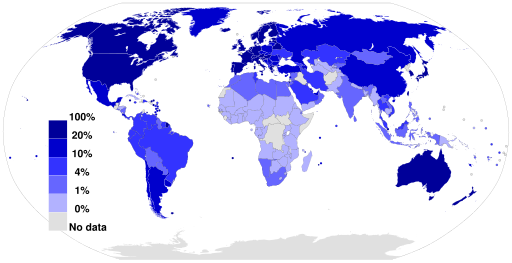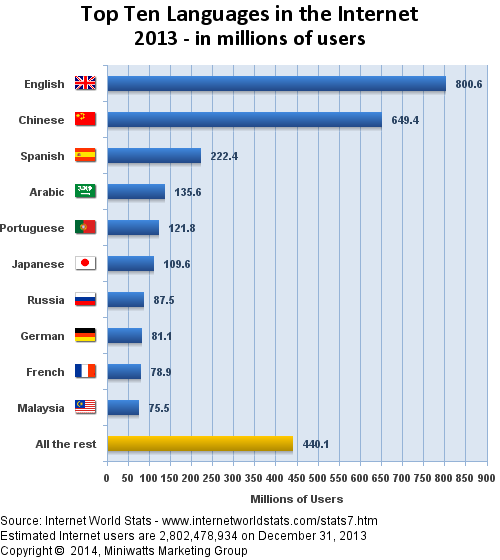We see the internet as being a global network, a level playing field, a way to access all the information and tools we need.
If “we” refers to English speaking members of developed countries, then you’d be correct. But for the majority of the world, that is not true.
I believe that we as creators of software have a responsibility to change that, and I want to do my part.
A big company like Evernote can have its website and tools available in 24 languages, which is great. But what can tiny independent software vendors like me do to make software truly global?
The answer is simple: “Try.”
Language
I don’t believe that having English as a de facto language in realms such as politics and science is a bad thing. A common language is an incredibly useful thing to have. As someone who went to an English-speaking school in an Arabic-speaking country, I deeply appreciate the reach of the English language.
But we can’t use the commonality of English as an excuse to alienate non-English speakers.
I sometimes get support messages in stilted English, where the first thing that the user does is apologize to me for their English. I think this is completely backwards.
If I’m selling software on the internet, you should be able to contact me in whatever language you’re most comfortable. The responsibility should be on me to translate and understand.
Step one: At least greet people in their own language, as a courtesy.
I am learning a growing list of casual greetings and sign-offs in various languages. It’s a small step, but an important one.
Step two: Make it clear that we accept support requests in all languages. I can’t afford a multi-lingual support staff, but I do have access to Google translate, and it’s really not that hard to piece things together with a little bit of context.
Connectivity
I’ve been silent about this out of guilt, but I won’t be any further.
Gingko requires you to be online at all times.
It sucks, and I’m aware of that.
Even with an always-on high-speed connection, I too resent the fact that if the net goes down, I can’t write. That I can’t take my laptop to a quiet library without wifi and get my work done (a great deal of which happens in Gingko).
If I, in Canada’s second largest city, find the need to be connected a restriction, what of the millions upon millions across the world who have less reliable connections?

This is changing, and I’ve made some bit of progress with Gingko offline recently, but it’s quite a challenge. Of one thing I am certain: However difficult it may be, being offline-first not an optional feature for global software.
Broadband always-on internet is simply not affordable to most of the world.
Cost
Which brings me to another challenge of global software: pricing.
A dollar for someone in the US or Canada is something you can lose and forget about. For someone in Malawi, it most certainly is not.
So why not scale prices by local purchasing power?
While it would be possible, it would also be a challenge to implement.
What about “pay what you want” models?
This is simpler to implement, but the barrier is a different one: Fear.
Fear that I won’t be able to support my own family, in the interest of making Gingko more globally accessible.
Is it a rational fear? Maybe not, but it’s there and until I can be rid of it, I and many others feel stuck on a traditional monthly fixed-price subscription.
An Open Mind
Making global software has its technical challenges. There are payment and currency issues, the cost and time associated with implementing and maintaining multiple languages, the challenge of rewiring the software’s architecture for offline access.
But none of these are insurmountable, or even necessarily more challenging than implementing a large feature.
The biggest challenge to global software is mindset.
It’s the choice to place the burden of translation on ourselves, and not our users. It’s the willingness to consider radically different pricing models. It’s the courage to replace fear and secrecy with trust and openness.
To paraphrase the visionary leader who created VISA, Dee Hock:
In the end, it’s about forgetting about how things were and how they are, and thinking instead not of how they will be, but how they ought to be.
Links & Further Reading:
- Information Geographies , Oxford Internet Institute
- Global cost-of-living comparison map: Numbeo.com
- Languages Used on the Internet (Wikipedia).
Note the disparity in the language of the content, which is overwhelmingly English, and the language of the users with a more even mix of languages.

I love the idea of just making Gingko more available to every and each of us on this planet.
I am with Chinese native speaking, would be glad to help with my humble capacity. However, I still do not know whether Gingko is accessible IN China (not tested by myself yet), because of China’s very specific situation that lots of globally used websites are simply not available there.
Gingko is great!
Hi Guanbin,
I know that Gingko is available in China, as we have users and customers there.
Thanks for the offer to help. I hope to have an open-source translation project for Gingko one day.
感谢您发表评论!
Adriano
Ciao Adriano,
Gutted Guanbin has proceeded me! lol I am a certified Chinese-English translator, living in Europe at the moment. I just want to say I love Gingko (a lot!) and please let me know if I could help in any way. Just drop me an email and I will be there for you 😉
Best,
Joseph
Hi Adriano,
if you ever need help with German, just let me know – I’m a business writer, editor and translator and my mother tongue is German.
Offline-mode for Gingko would be great, Mindmeister has implemented it for their browser-based mindmapping software – and it’s really helpful. It’s not just internet outages but something simple like travelling.
And speaking about “pay what you like”: Could you do an A/B test for this?
I know that one of our old freelance programmers did “pay what you like” for all his services and actually made a good living from it.
Thanks for the offer for help with German, Jens. I will follow take you up on that soon 🙂
As for the A/B test, I would have done it already if it were easy to do with Stripe.com, but it would take a little hacking.
Worth a try though… I know that some would pay less, but others would pay more (just yesterday a customer said I should be charging 20 times more for Gingko 🙂 )
One more thing about making Gingko available globally: not everyone has a credit card. Adding at least PayPal and/or other micropayment possibilities might be a good idea.
I mean, I’m living in Germany and I don’t need a credit card for my daily live. I can always use my EC card (directly connected to my bank account and with much lower fees than a credit card). If I have to pay for something via credit card, I always have to put money into my prepaid credit card first.
Just as an example.
Hi Jens,
Yes, I’m aware of payment processing being the biggest road-block.
Most places aren’t as ccard obsessed as here in N.America.
I figure it’s a worthwhile goal nonetheless, and will keep an eye out for other options.
Hi Adri!
I’m just testing Gingko now and there are some things I love about it and some things that will change the way I work, if I choose to stick with it. (Not a negative, just a personal challenge, right?) And it’s given me an idea for another writing tool, for novelists, which I’ll develop and then share.
But I came to this page and I LOVE IT. Your philosophy is wonderful. Thank you, thank you, thank you. I’m someone who pays for “please consider paying” software, especially if there’s something extra unlocked for it. (And before you look me up, no, I haven’t paid for Gingko yet, because I’m not sure if I’ll go this way or switch back to what I was using before.)
I have a few suggestions on the money, though, because it’s important that you can feed your family:
– Have you considered a way for your basic edition users to donate to you? For example, I don’t know if I’m going to need the extra features. The probability that I’ll sign up with you long term is about 50% because some of the in-development features are things I can’t wait for. But I’d happily throw down a few dollars for the time I am using it, as a once-off. I wouldn’t expect it to unlock any features. I’d just feel good about it, because you’ve done a good thing and I don’t need to get it for free.
– Have you considered a way for people to pay more than the recommended rate, and perhaps put it in a kitty for users without much money. E.g. a checkbox that says, “I want to make Gingko cheaper for users in Malawi” that adds 10% on (or a custom donation amount) and you then offer a discount to users in disadvantaged countries.
I’m sure these aren’t solutions, but hopefully they will send you down a line of thinking that eventually leads you to the best solution.
Thank you again for this amazing tool that you’ve given to the world so cheaply 😀
Students Factory
Students Factory is a largest and longest running Educational Promotion. Students Factory helps to improve the English lingua to the international level by learning new concepts & developing correct usage with the post modern competitive level. We impart our linguistics expertise to provide the highest quality of educational programs to the global educational sector. Students Factory further adds its value with Professional/Corporate Training & Development, Team building sessions, Learning applications & CER initiatives. Our purpose is to inspire the students of today and yesterday for a better tomorrow.
https://studentsfactory.co/